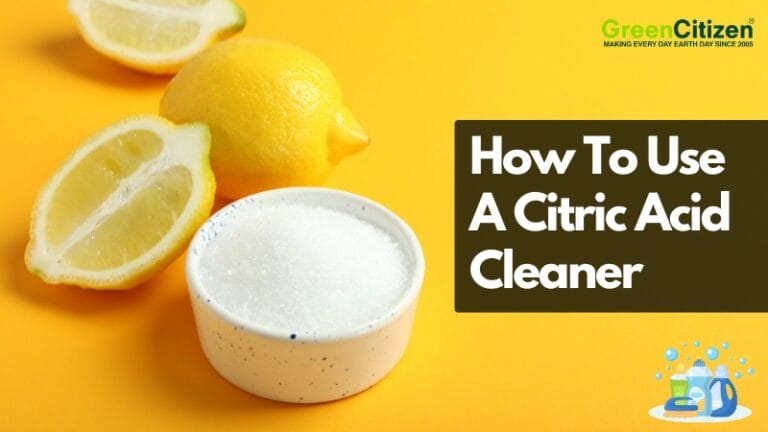A Citric Acid Cleaner is a simple DIY acidic cleaning solution made by dissolving citric acid powder in water. It’s especially good at descaling and removing hard water buildup like limescale (mineral deposits such as calcium carbonate), plus soap scum and dulling water spots on many non-porous surfaces.
In this guide, you’ll learn the best mixing ratios, exactly how to use a citric acid cleaner on common household items (kettles, coffee makers, faucets, showerheads, dishwashers), and which surfaces to avoid (like natural stone and some metals).
Quick safety note: citric acid is commonly used in food, but the dry powder and stronger solutions can irritate eyes, so use good ventilation and consider gloves and eye protection.
And if your goal is true “disinfection” after someone has been sick, follow CDC guidance and use an appropriate disinfectant product according to its label instructions.
Key Takeaway:
A Citric Acid Cleaner is a simple DIY descaler that dissolves limescale, hard-water stains, and soap scum on kettles, showerheads, faucets, and many non-porous surfaces. Mix citric acid with warm distilled water, let it dwell briefly, then rinse. Avoid natural stone and aluminum, and follow labeled disinfectants when true disinfection is needed.
What Is a Citric Acid Cleaner
A Citric Acid Cleaner is a diluted citric acid cleaning solution used to dissolve limescale, hard water stains, and soap scum. Because citric acid is mildly acidic and acts as a chelating agent, it loosens mineral buildup so it can be wiped or rinsed away.
Citric acid is a naturally occurring organic acid found in citrus fruits, but for cleaning you’ll typically use food-grade citric acid powder (E330). In water, it creates an acidic solution that helps break down alkaline mineral scale (like calcium carbonate), making it useful for descaling appliances and shining fixtures.
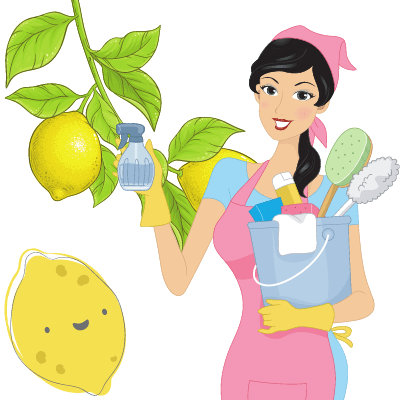
What Is the Best Citric Acid Cleaner Ratio?
The best citric acid cleaner ratio depends on the job: use a mild mix for weekly wipe-downs and a stronger mix for descaling kettles, coffee makers, and stubborn mineral deposits.
Use distilled water if possible (helps reduce mineral contamination and keeps mixes more consistent).
Citric Acid Cleaner Ratios
| Strength | Best For | Mix (Metric) | Mix (US) |
|---|---|---|---|
| Light | quick wipe-downs, glass water spots | 10 g per 500 ml | 2 tsp per 2 cups |
| General | faucets, sinks, shower glass, toilet ring | 15 g per 500 ml | 1 tbsp per 2 cups |
| Descaling | kettles, coffee makers, showerheads, heavy limescale | 30 g per 500 ml | 2 tbsp per 2 cups |
💡 Pro tip: Start with General, then step up to Descaling only if buildup is stubborn. Stronger isn’t always better, especially for delicate finishes and grout.
How to Prepare a Citric Acid Cleaner Solution
To make a Citric Acid Cleaner, dissolve measured citric acid powder into warm distilled water, pour into a labeled spray bottle, and store safely. Always spot-test new surfaces and rinse after use.
Ingredients
- Citric acid powder (food-grade is fine)
- Distilled water (recommended)
- Spray bottle or non-metal container
- Optional: a few drops of essential oil for scent (not required for cleaning)
Mixing Instructions
- Warm the water (warm helps the powder dissolve faster).
- Add the measured citric acid powder (use the dilution table above).
- Stir in a non-metal bowl using a plastic or wooden spoon.
- Pour into a labeled spray bottle (write: “Citric Acid Cleaner + date + strength”).
- Store out of reach of kids and pets.
Storage and Handling
- Make smaller batches so you’re always using a fresh, consistent solution.
- Avoid metal storage containers (acid + some metals = corrosion risk).
- Spot-test: Spray an inconspicuous area first, especially on coated surfaces and colored grout.
How to Use a Citric Acid Cleaner
Use a Citric Acid Cleaner by applying it to mineral buildup, giving it a short dwell time, then wiping and rinsing thoroughly. It’s best for limescale, soap scum, and hard-water film, not for protein stains.
The Simple Method
- Spray or apply the solution.
- Let it sit (usually 30 seconds to 5 minutes, depending on buildup).
- Scrub lightly with a microfiber cloth or soft brush if needed.
- Rinse with clean water and wipe dry.
Below are the 10 best household uses for citric acid:
1. Citric Acid Cleaner for Kettles and Coffee Makers
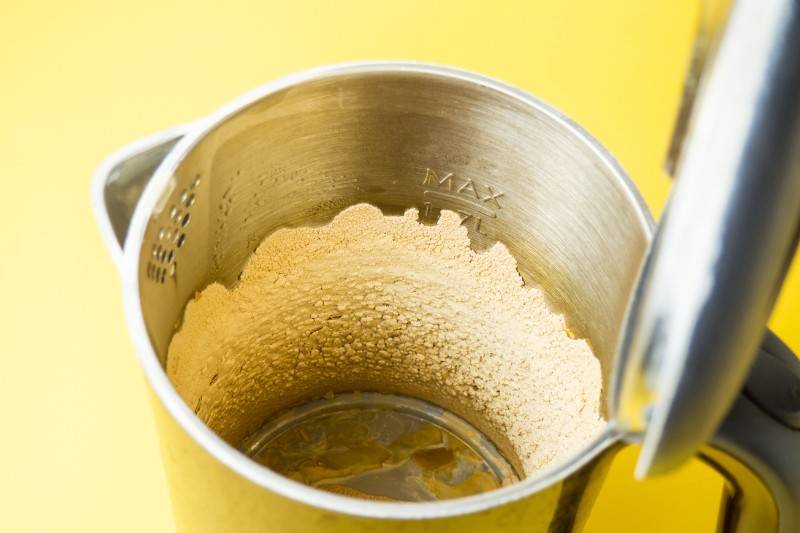
Best mix: Descaling
Dwell time: 10 to 20 minutes (or per manufacturer guidance)
- Fill the kettle/coffee maker reservoir with water.
- Add citric acid cleaner (or add citric acid powder directly using your ratio).
- Heat or run a brew cycle (for kettles, bring close to a boil).
- Turn off and let sit.
- Empty, rinse thoroughly, then run 1 to 2 plain-water cycles.
Note: If you taste any tang afterward, keep rinsing. Citric acid is food-used, but you still want no residue.
2. Citric Acid Cleaner for Dishwasher Buildup and Odor
Best mix: Descaling
Dwell time: full hot cycle
- Ensure the dishwasher is empty.
- Add citric acid powder to the detergent compartment OR place a bowl of solution on the top rack.
- Run the hottest cycle.
- Wipe the door seals and edges afterward (where grime hides).
Avoid: Mixing with bleach-based dishwasher products.
3. Citric Acid Cleaner for Washing Machine Degunking
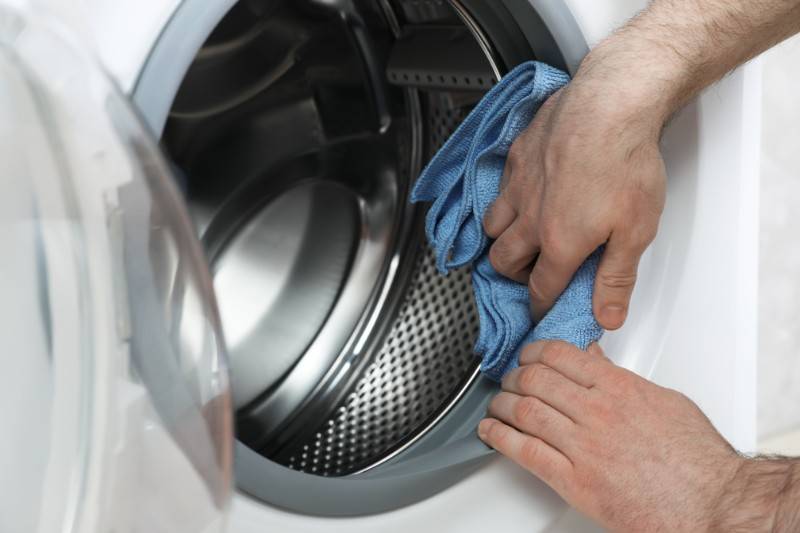
Best mix: Descaling
Dwell time: full hot cycle
You can also try some other potent DIY washing machine cleaners that you can make easily make at your homes.
- Run an empty hot cycle.
- Add citric acid powder (or solution) at the start of the cycle.
- Once finished, wipe the drum rim and rubber gasket.
Why it works: It helps dissolve mineral scale and detergent film that can cause smells.
4. Citric Acid Cleaner for Faucets and Sinks
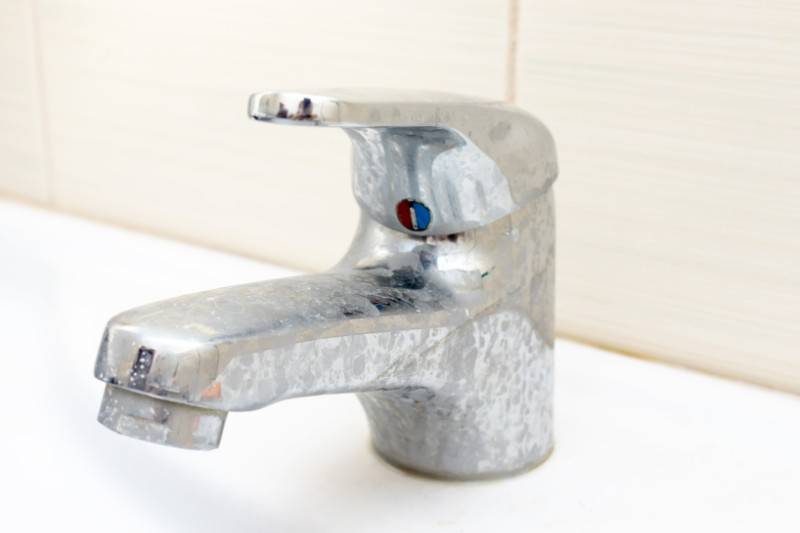
Best mix: General
Dwell time: 30 seconds to 2 minutes
- Spray the faucet and sink areas with the solution.
- Let it sit briefly.
- Wipe with microfiber.
- Rinse and dry for a streak-free shine.
Extra: Wrap a solution-soaked paper towel around crusty areas for 5 minutes, then wipe.
5. Citric Acid Cleaner for Toilet Bowl Hard Water Stains

Best mix: General to Descaling
Dwell time: 10 to 30 minutes
- Spray or pour solution around the ring.
- Let it sit.
- Scrub with a toilet brush.
- Flush and repeat if needed.
Tip: Regular weekly use prevents the “mystery ring” from returning.
6. Citric Acid Cleaner for Kitchen Counters and Everyday Grime
Best mix: Light to General
Dwell time: 30 seconds
- Spray lightly.
- Wipe.
- Rinse if the surface contacts food.
Important: This is great for cleaning, but for situations that truly require disinfection, use a product labeled as a disinfectant and follow the label instructions.
7. Citric Acid Cleaner for Stainless Steel Water Spots
Best mix: Light or General
Dwell time: 30 seconds to 1 minute
- Spray onto the cloth (not directly onto electronics).
- Wipe with the grain of the stainless steel.
- Rinse with a damp cloth, then dry.
Avoid: Leaving it sitting too long on finishes you haven’t tested.
8. Citric Acid Cleaner for Toaster Oven Racks and Baked-On Residue
Best mix: Descaling
Dwell time: 30 to 60 minutes soak
- Soak racks in hot water with citric acid solution.
- After soaking, scrub with a non-scratch pad.
- Rinse thoroughly and dry.
Tip: Repeat rather than using extreme strength that might affect coatings.
9. Citric Acid Cleaner for Water Heater Descaling
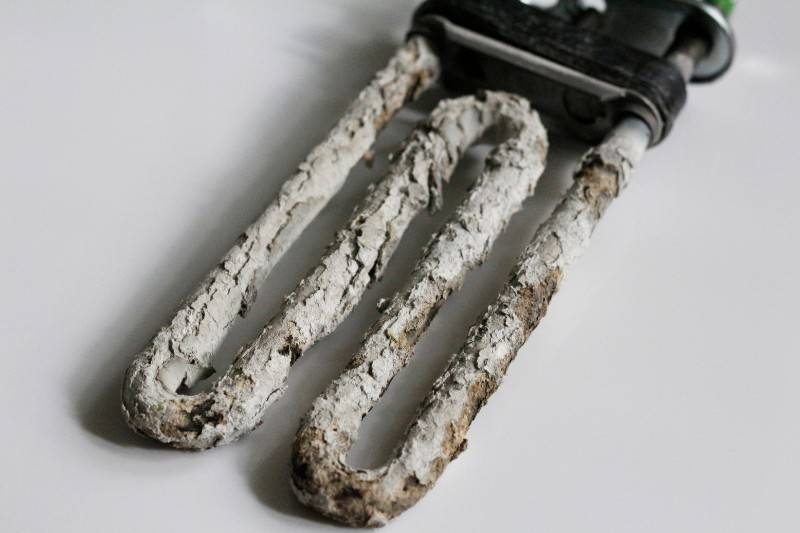
Best mix: Descaling
Dwell time: varies, follow manufacturer guidance
Water heaters vary a lot (tank vs tankless; brand requirements). For safety and warranty reasons:
- Check the manual first.
- If your manufacturer supports descaling, use a citric acid descaler solution at the recommended concentration.
- Flush thoroughly afterward.
If you’re unsure: This is one of the few jobs where calling a professional can be the cheaper option compared to a damaged heater.
10. Citric Acid Cleaner for Showerheads and Nozzles
Best mix: Descaling
Dwell time: 30 to 60 minutes soak
- Remove the showerhead if possible.
- Soak in a bowl of hot citric acid solution.
- Use a soft brush or toothpick for clogged nozzles.
- Rinse thoroughly and reinstall.
Fast alternative: Fill a bag with solution, tie it around the showerhead, soak, then rinse.
How Citric Acid Cleaner Works
A Citric Acid Cleaner works by lowering pH and dissolving alkaline mineral deposits (limescale) while also helping loosen soap scum and buildup so it wipes away more easily.
Hard-water deposits are often alkaline and mineral-heavy. Citric acid attacks that scale, breaks up residue bonds, and helps lift grime from surfaces, especially where water evaporates and leaves mineral film behind.
When to Use a Citric Acid Cleaner
Use a Citric Acid Cleaner for mineral-based problems like limescale, calcium deposits, and soap scum. Skip it for protein-based stains (blood, egg) and greasy messes that need surfactants or enzymatic cleaners.
Best uses:
- Hard-water stains and mineral scale
- Soap scum in bathrooms
- Descaling kettles, coffee makers, showerheads
- Water spots on glass and stainless steel
Not ideal for:
- Protein stains (enzymes work better)
- Some oil-heavy messes (you may need a degreaser first)
Is a Citric Acid Cleaner Safe
A Citric Acid Cleaner is generally safe when diluted and used properly, but the powder and stronger solutions can irritate eyes and sensitive skin.
Use ventilation, avoid splashes, and consider gloves and eye protection.
Safety checklist:
- Wear gloves if you have sensitive skin or cuts.
- Avoid touching eyes during use.
- Ventilate the room when spraying.
- Store labeled solutions out of reach.
- Rinse surfaces after cleaning, especially food-contact surfaces.
Does Citric Acid Damage Surfaces?
A Citric Acid Cleaner can etch natural stone (marble, granite, limestone, travertine) and may corrode aluminum. Spot-test first on sealed, coated, painted, or delicate surfaces.
Generally safe on:
- Glass
- Ceramic and porcelain
- Many plastics
- Stainless steel (with proper rinsing and not excessive dwell time)
Avoid or use extreme caution on:
- Marble, granite, limestone, travertine
- Unsealed grout or colored grout (test first)
- Aluminum
- Waxed or oil-finished wood
How Often to Clean With Citric Acid Cleaner
Use a Citric Acid Cleaner weekly on high-limescale areas and monthly for appliance descaling, adjusting frequency based on how hard your water is.
Suggested schedule:
- Faucets, sinks, shower glass: weekly
- Showerheads: monthly to quarterly
- Kettles and coffee makers: monthly (more if hard water)
- Dishwasher and washing machine: monthly maintenance cycle
The Do's and Don'ts When Using Citric Acid as a Cleaner
The best results come from correct dilution, short dwell time, and thorough rinsing. Don’t use it on natural stone or mix it with bleach.
Do’s
Don’ts
- Wear gloves when handling citric acid, especially if you have sensitive skin or cuts.
- Test first: Spot-check new surfaces to avoid potential damage.
- Use warm water: Mix citric acid with warm water for better solubility and cleaning power.
- Label and store properly: Keep pre-mixed solutions in labeled spray bottles, out of reach of kids and pets.
- Rinse thoroughly: Wash surfaces with water after cleaning to remove any residue.
- Add essential oils for extra antibacterial properties and a fresh scent.
- Dilute wisely: Use a weaker solution for regular cleaning; save stronger mixes for tough jobs.
- Skip the surface check: Avoid using citric acid on marble, granite, or other natural stones—it can etch the surface.
- Mix with bleach: This combination releases harmful gases.
- Forget grout care: Test colored grout first to prevent discoloration.
- Neglect ventilation: Even non-toxic cleaners need fresh air for safe use.
- Dump without diluting: Dispose of leftover solutions responsibly by diluting them first.
5 Best Citric Acid Cleaning Products
If you don’t want to DIY, a Citric Acid Cleaner product can offer consistent concentration and convenience. Pick based on format (powder vs pods vs concentrate), intended use (dishwasher vs all-purpose), and fragrance sensitivity.
How we chose
- Citric acid as a primary active ingredient or main function (descaling)
- Clear intended use cases (dishwashers, appliances, all-purpose)
- Practical packaging and repeat-use value
1. Citra Solv Natural Cleaner & Degreaser Concentrate
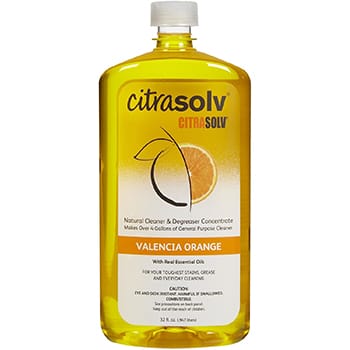
This is one of the most concentrated natural green cleaners available in the market today. It allows for countless uses in pure or diluted form to clean practically every part of your house.
People also love the fresh smell of citrus fruits that it leaves behind.
The main advantage is that you don’t have to dissolve the citric acid powder and try to figure out the ideal concentration. I’ve used it for cleaning everything from my floors to the BBQ grill, and the small bottle seems to last for a very long time.
2. Milliard 100% Citric Acid
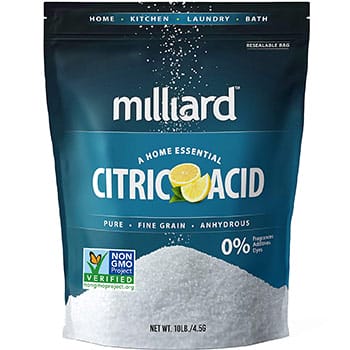
If you prefer mixing up your own concentrate, Milliard provides you with perfectly fine granules to make it easier to dissolve.
It comes in a large 10-pound bag, so you’ll have enough citric acid to keep you going for many months, even if you have a large home to keep clean. I also put a scoop of this in my washing machine every two weeks; despite having very hard water, the heating element stays limescale-free.
It’s also a food-grade product, so you could use it as a flavoring for homemade ice cream or candy.
3. Pure Organic Ingredients Citric Acid
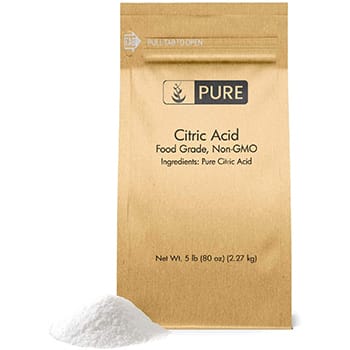
This Pure product is possibly one of the finer grain citric acids available. The benefit of this is that it’s easier to apply directly to tough limescale and gently lift the stains. You can even make a paste by mixing it with baking soda and just a few drops of water.
Also, as it’s organically sourced, it would provide added peace of mind if you plan to use it in food.
It’s ideal for making homemade ice cream, cakes, and candy. Because it’s such a fine powder, you won’t have to worry about it properly mixing with the food.
4. Lemi Shine Complete Dishwasher Bundle
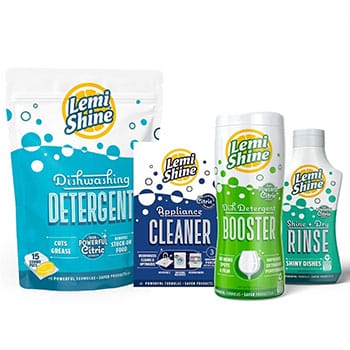
I love these Lemi Shine products as they come in four different containers at different concentrations.
Simply pick one of the products depending on whether you need to deep clean one of your appliances or just want to add some extra sparkle to your glasses in the dishwasher.
They come in convenient pods and will work wonders to cut through dirt and grime that builds up over time.
I simply set a reminder on my phone to put one of these in an appliance every two weeks, and they always stay fresh and clean-smelling.
5. Halefresh Citric Acid
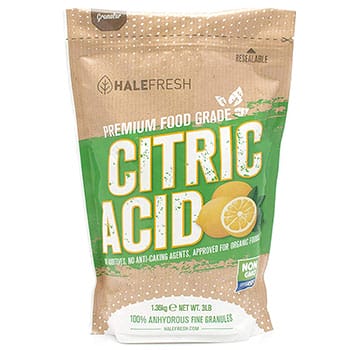
There are no unnecessary added anti-caking agents that might otherwise make it less effective. Simply mix it with warm water and essential oils, and enjoy the fresh smell it leaves behind.
I also find the pouch very convenient as it takes up less space on my cleaning product shelf in the pantry. And unlike other pouches, the seal closes perfectly every time to keep the granules dry and ready to use.
You can even use it for preserving or preparing food so let your imagination go with this citric acid.
Frequently Asked Questions (FAQ)
Yes, you can mix citric acid and vinegar, but it might be unnecessary. They both contain acids, but citric acid is more effective at dealing with limescale. Some folks also don’t like the smell of vinegar, preferring the fresh citrus scents.
Yes, citric acid is antibacterial and effectively deals with the most common household germs. It does this in a completely natural way where the acid attacks the outer membrane of bacteria and completely breaks them up.
Yes, citric acid can bleach clothes in high concentration. It’s not as potent as standard bleach, but you may want to be careful while cleaning. If you mix up a high concentration to deal with tough stains, then try to avoid contact with your clothes.
No, citric acid isn’t stronger than vinegar. The acetic acid in vinegar is a lot more aggressive and corrosive when it comes in contact with certain surfaces. But, there are many types of mineral deposits that citric acid can better deal with.
Yes, you can mix baking soda and citric acid, which is an effective combination for dealing with detergent deposits in appliances. The general recommendation is to aim for a 2:1 mix.
Yes, you can mix borax and citric acid. Some folks believe this is one of the best combinations for cleaning toilets.
Final Thoughts
A Citric Acid Cleaner is one of the most effective eco-friendly tools for fighting limescale, hard-water stains, and soap scum. Use the right ratio, avoid sensitive surfaces, and rinse thoroughly for safe, reliable results.
If hard water is constantly dulling your fixtures and clogging your showerhead, a citric acid cleaning solution is a simple habit that pays off fast. Keep a labeled spray bottle on hand, follow the dilution guide, and treat descaling as monthly maintenance instead of a once-a-year battle.
